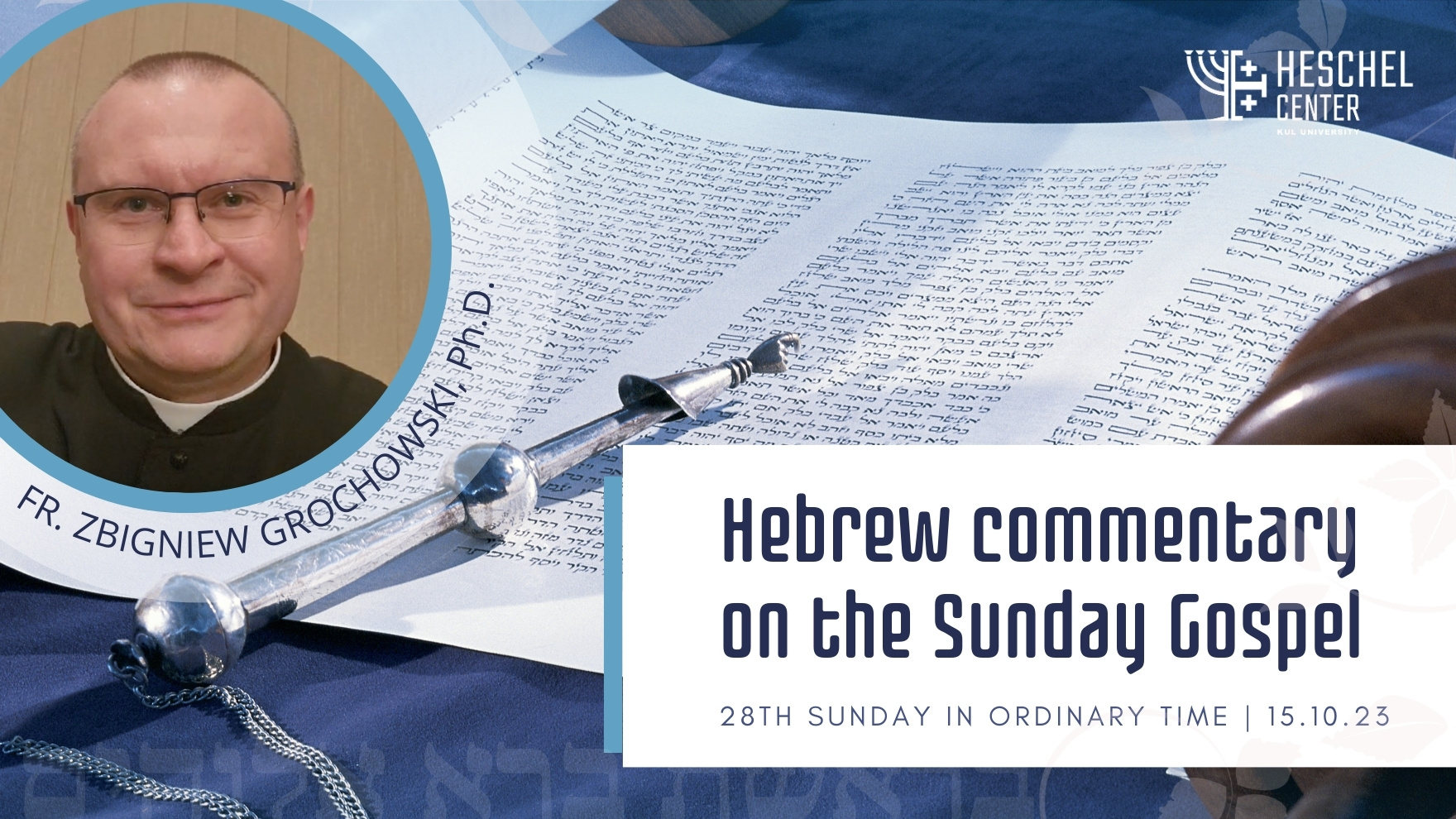The choicest feast – God’s promise shared by Christians and Jews


Photo_KUL Heschel Center
God and God-inspired Biblical writers knew very well that an image of a feast will be a powerful incentive for the followers of Judaism and Christianity who seek salvation, observes Bible scholar Fr. Dr. Zbigniew Grochowski in a commentary for the Catholic University of Lublin Heschel Centre for the Sunday, October 15, stressing the symbolic meaning of the feast in the tradition of both Old and New Testament, symbolic of the heavenly banquet of the saved ones.
Already in the Old Testament, the prophet Isiah among others referred to a feast, symbolic of the universal aspect of salvation. An invitation to this feast was sent to “all people and all nations” (Is 25:6-10a). A free invitation, however, does not imply inaction on the part of those invited. “Although the King’s generosity testifies to the gratuitousness of His grace and the greatness of His gift, if a person wishes to take advantage of it, they must appropriately respond to this invitation and accept it with gratitude oraz prepare for the feast by securing a wedding dress as one wild not be able to sit at table without donning it (Mt 22:11-14)”, observes Fr. Grochowski.
The “rich food and choice wines” (Is 25:6) which Isaiah mentions make up an image of magnificence of the heavenly feast. “Naturally, what is meant here is not the relishing of earthly appetite. In reality, the prophet talks about eschatological happiness, which is present not only in the image of the feast, but also expressed in the truth about the definitive annihilation of death and cancellation of all woe, ignominy, and tears” (Is 25:8), stresses the Bible scholar.
In Jesus’ parable in chapter 22 of the Gospel according to Matthew, we see God as a King, extending an invitation to his Son’s wedding to a first group/circle of people, especially welcome at a reception. As Fr. Zbigniew Grochowski, “their resentment and contempt provoke the King’s anger and inspire him to broaden the circle of those treated as guests: now the King’s servants make it possible for literally ‘all, good and bad alike’” (Mt 22:9-10) to attend the feast.
God’s unparalleled generosity calls for a generous response on the part of the invited person. “Man, for his part, must demonstrate his openness to God’s invitation and his willingness to cooperate with the grace extended. This is symbolically expressed in the need to prepare a wedding garment, which in Scripture symbolises the intrinsic dignity of the human person”, notes the Bible scholar, pointing to the wedding garment as a symbol of purity of heart and a guarantee of entry into the King’s feast. Importantly, this garment does not only signify freedom from sins, but above all the possession of good works. “The Lord offers a free gift of grace, but it must be matched by a positive response from man, expressed not only in a verbal declaration of acceptance, but also in active cooperation, the fruit of which will be good works that fulfil God’s will”, concludes Fr. Zbigniew Grochowski.
Video:
Full text:
Repentant sinners before the righteous – the Jewish sources of Jesus’ parable >>>
Limit of forgiveness or forgiveness without limit? >>>
Forgiveness which may do harm to the victim and the abuser >>>
The life of St. Peter – love that overcame fear >>>
Ties bound on earth and in heaven >>>
Jesus points to pagan woman as example of faith >>>
The calming of the storm on the lake in the eyes of the first Jewish listeners >>>
The mountain of transfiguration – a place of my being with God >>>
Sometimes you have to go on a long journey to find the treasure hidden within yourself >>>
Revelation reserved for the foolish, or the provocation of Jesus >>>
Jesus on the Jewish value of spiritual service to the righteous >>>
The New Torah and Jesus as the new Moses and the new Joshua >>>
The day is short, the work is plentiful, and the people are insolent, and the reward is great >>>
Eucharist – New Manna, God present here and now >>>
Hebrew Commenary to the Gospel: Three Names of One God >>>
The Pentateuch’s prophets and Moses predicted the outpouring of the Holy Spirit >>>
The end which is a new beginning – about an ever-present God >>>
Paraclete – three meanings of the Greek word hidden in the Old Testament >>>
The first covenant of God with the Jews is still valid >>>
Selective listening to Scripture – the mistake of the disciples at Emmaus >>>
God’s mercy inscribed on the pages of the Old Testament >>>
After his resurrection, why did Jesus first appear to women? >>>
Passover – the celebration of freedom and faith >>>
The more we know about Passover, the more we can understand the Last Supper >>>
Why did Jesus let Lazarus die? >>>
Who sinned, the blind man or his parents? >>>
How did the seventh man change the life of the Samaritan woman? >>>
Who was transfigured on Mount Tabor – the disciples or Jesus? >>>
The Desert – A Blessing or a Curse? >>>
KUL Heschel Center: Misunderstandings over the „eye for an eye” principle >>>
Law, Prophets, iota – we need to examine the context to understand the meaning of Jesus’ words >>>
Heschel Center KUL: What do salt, light and the city on a mountain mean to us? >>>
Heschel Center KUL: Why did the disciples, becoming „fishers of men,” abandon their nets? >>>
Hebrew Commentary to the Sunday Gospel excerpt – 2nd Sunday in Ordinary Time; Year A >>>
Jewish Commentary on the Gospel >>>
Hebrew commentary on the first Sunday of the New Year Gospel >>>
Jewish commentary on the Christmas Gospel >>>
Hebrew commentary on the Gospel for the Fourth Sunday of Advent >>>



Dodaj komentarz